How Should We Write About War and Trauma? Tom Sleigh Looks to David Jones
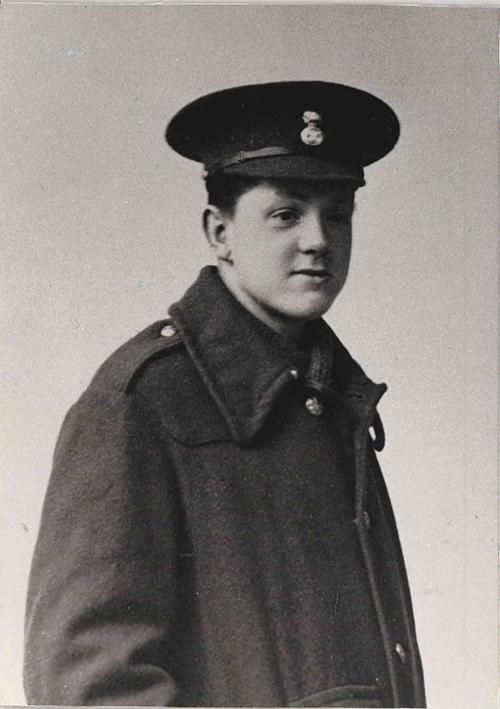
Our November 2013 issue features an in-depth essay by Tom Sleigh on poet and painter David Jones. Admired by W.B. Yeats and lauded by W.H. Auden, Jones was well-known among the British modernists. His first literary publication was the book-length poem In Parenthesis, issued by Faber and Faber in 1937 with an introduction by T.S. Eliot. Jones may not receive the same name recognition today, but perhaps Sleigh's essay will change that. The following is a visual companion to the essay, pairing Sleigh's reading of this modernist poet with Jones's own sketches from World War I. (All images courtesy of the First World War Poetry Digital Archive.)
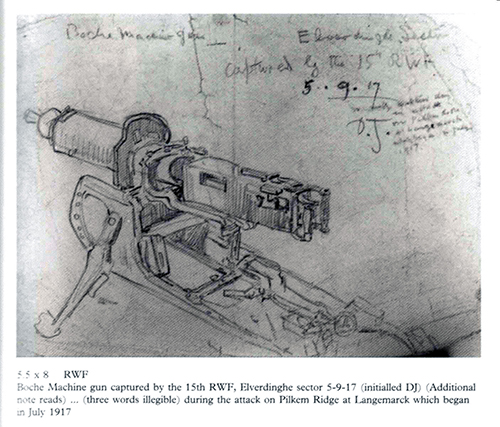
A journalist and poet who has spent time in Syria, Lebanon, and Somalia, Sleigh has struggled with writing about what he's seen. Jones's In Parenthesis, based on his experience of life on the front during WWI, offered Sleigh "a way into the war." The title of this essay, "To Be Incarnational," comes from how Jones used the word to describe poetry. Sleigh explains that Jones used incarnational literally:
The Word becomes the words that bring the war not only into focus, but make it so physically immediate that abstractions evaporate. The terrible physicality of the war registers in our senses before lodging in the understanding. But when it finally does lodge there, the outrage and irony and despair are so finely etched that any form of overt moralizing seems superfluous, if not a spiritual vulgarity.
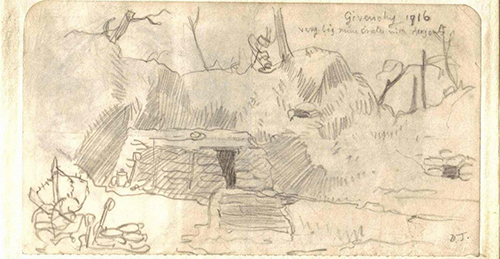
Jones achieves this immediate physicality by avoiding the romantic flourishes and "overt position of moral outrage" found in Wilfred Owen's poems, written two decades before In Parenthesis was published. Sleigh points out that in the intervening years the publication of Eliot's The Waste Land and Pound's Cantos gave Jones a "wider set of conventions" that weren't available to Owen:
Jones’s use of clashing vocabularies and tones, melding of Welsh myth with the everyday concerns of the infantryman, his elided categories, like pastoral combined with detailed observation of barbwire, achieves a music that can express the difference between what you ought to feel and what you do feel — not iron smashing against iron, but the difference between exploring a political emotion, say, rather than a political conviction.

Sleigh cites the following paragraph from In Parenthesis as a sort of ars poetica for Jones:
John Ball ... stood fixed and alone in the little yard — his senses highly alert, his body incapable of movement or response. The exact disposition of small things — the precise shapes of trees, the tilt of a bucket, the movement of a straw, the disappearing right boot of Sergeant Snell — all minute noises, separate and distinct, in a stillness charged through with some approaching violence — registered not by the ear nor any single faculty — an on-rushing pervasion, saturating all existence; with exactitude, logarithmic, dial-timed, millesimal — of calculated velocity, some mean chemist’s contrivance, a stinking physicist’s destroying toy.
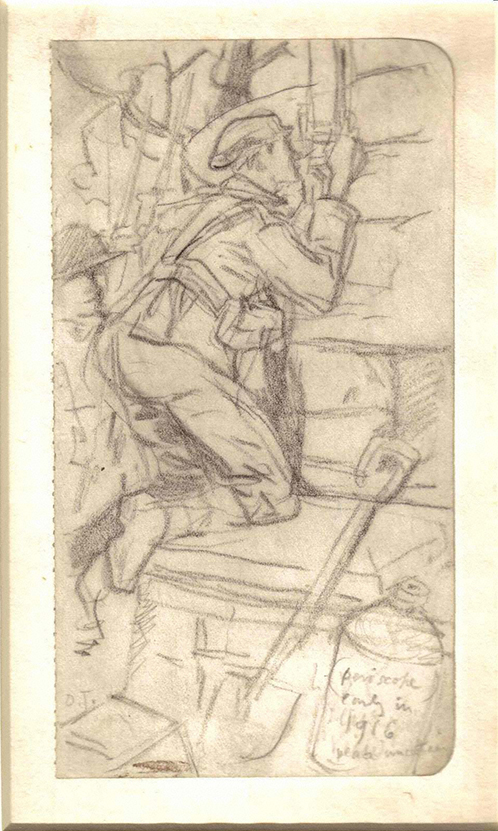
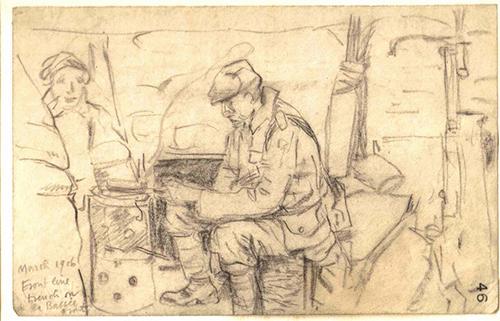
"No one has ever registered the minutiae of war, and the processes of perceiving that minutiae, as accurately or as fully as Jones. Like a PTSD nightmare, every detail is registered in the complete stop-time of trauma," writes Sleigh. This attentiveness not only to detail, but to his own particular perception through which he filters that detail, sets Jones apart:
It’s as if Jones instinctively recognizes that, as R.P. Blackmur once said, “Style is the quality of the act of perception” — which means that style is in part the hardwiring of how you perceive, in all your individual quirks, your personal histories, your borrowings and burgeonings from whatever cultural deposits you draw on and spring from. Registering that peculiarity of perception is what style is — which rescues the notion of style from mere decoration, or spurious individuality, or the affiliation with whatever school of poetry you subscribe to.
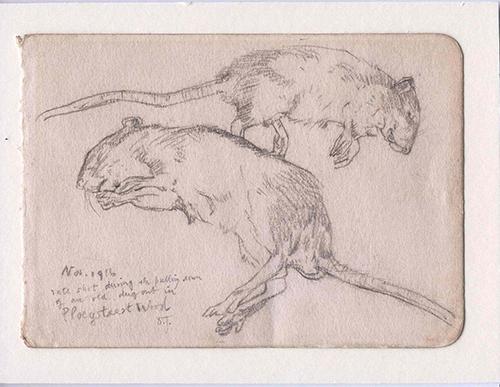

Sleigh points to one moment when Private Ball, the main soldier that In Parenthesis follows, throws a grenade back at a German soldier who had fired at him, killing the soldier. Private Ball "simply notes two things":
that he liked the colored label on the handle of the stick-bomb as it flew towards him; and after his grenade explodes, he notes how “you scramble forward and pretend not to see, / but ruby drops from young beech-sprigs — / are bright your hands and face.” And in that awful brightness Jones shows how poetic problems are, as such, problems of perception. That the artist is necessarily empirical rather than speculative. That the question for the artist, according to Jones, is always “‘Does it?’ rather than ‘Ought it?’” And that perception can’t be faked.
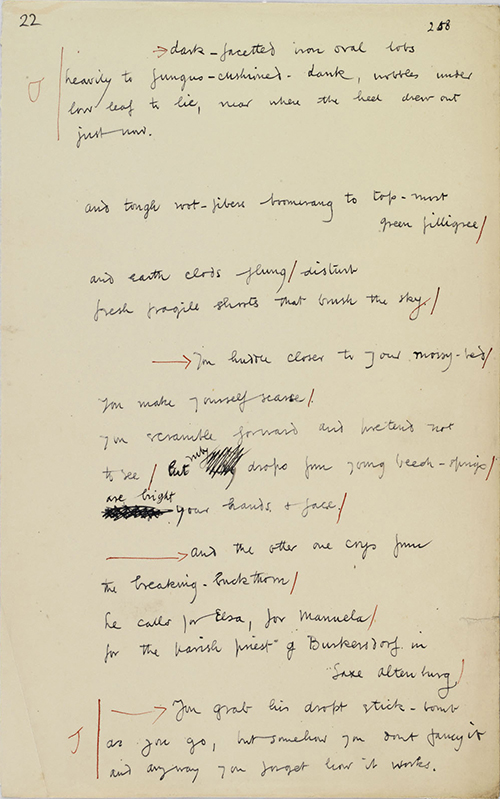

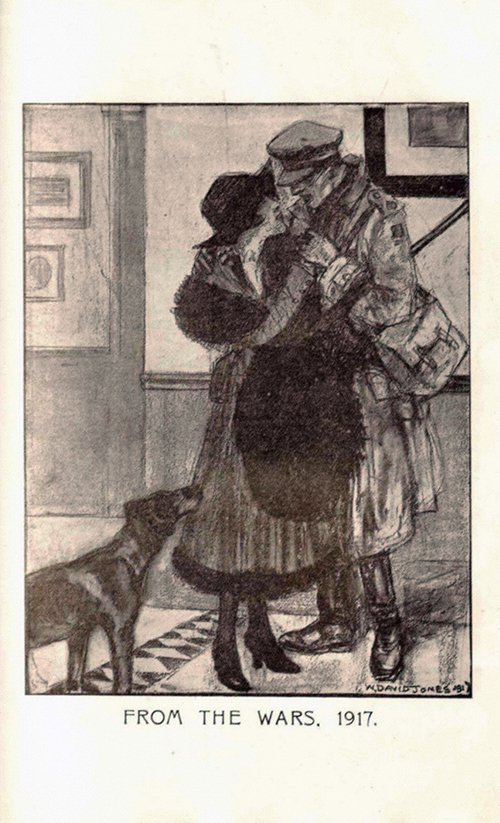
Jones's importance goes beyond being a "war poet." In fact, Jones writes in the preface to In Parenthesis that he did not intend it to be a "War Book," it just "happens to be concerned with war....We find ourselves privates in foot regiments. We search how we may see formal goodness in a life singularly inimical, hateful, to us." For Sleigh, this is valuable for any poet to consider, not just poets writing about war:
He is stating a basic human problem — how to find formal goodness in a hateful life. So he isn’t setting up shop as a war poet, or a political poet, or any kind of poet. He isn’t motivated by Justice, his poem doesn’t require sponsorship by any of the “Monumental certainties that go perpetually by, perpetually on time,” to quote Randall Jarrell. Which can’t be said of a lot of the poetry being written today about politically charged abstractions, like war, poverty, racism, and other forms of injustice.

Read the full essay for many more details on Jones's writing and Sleigh's struggles to convey his experiences of war and famine through his own incarnational language. Agree or disagree? Let us know what you think by writing to us in the essay's comment section.


